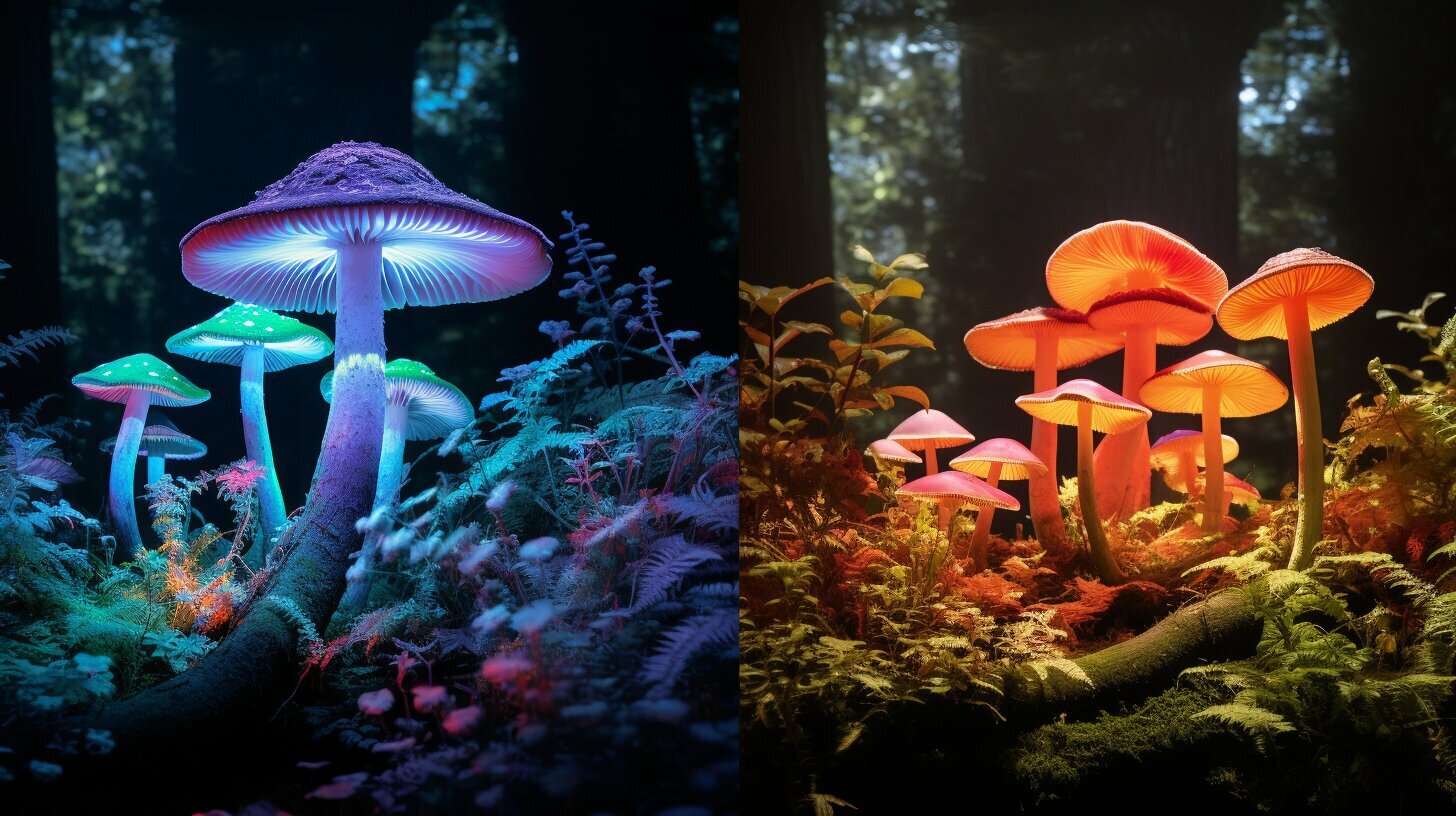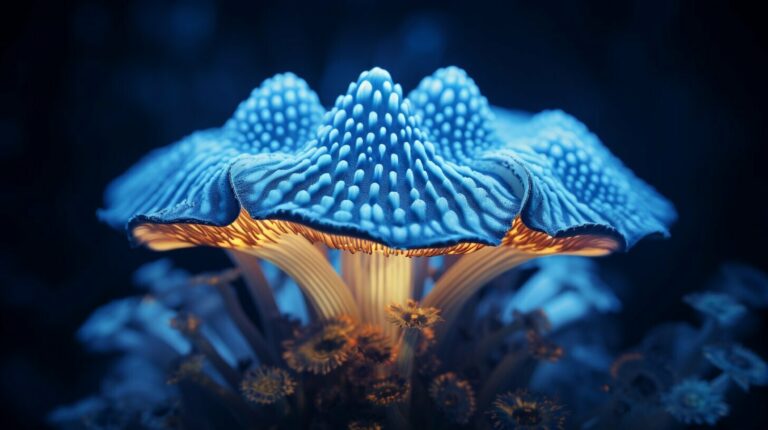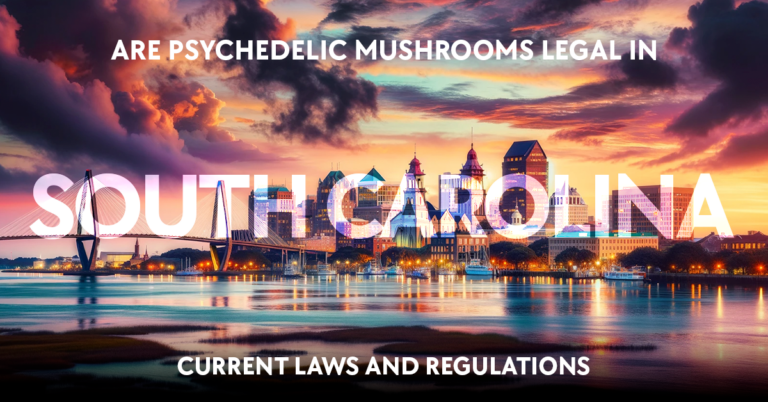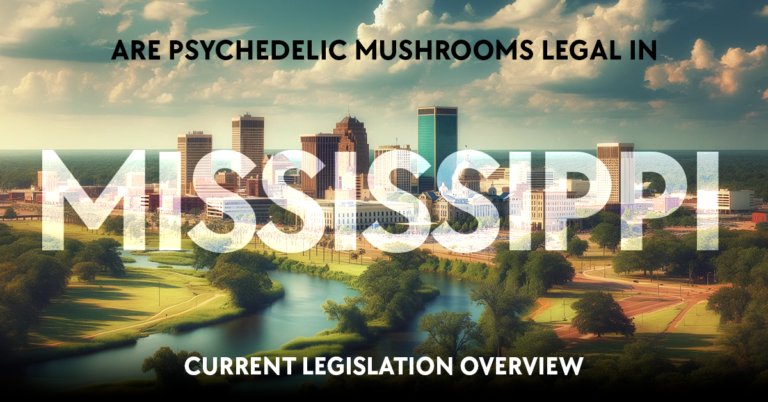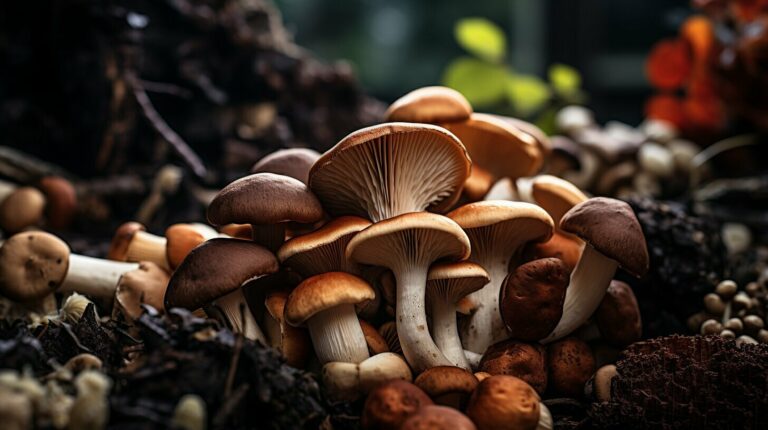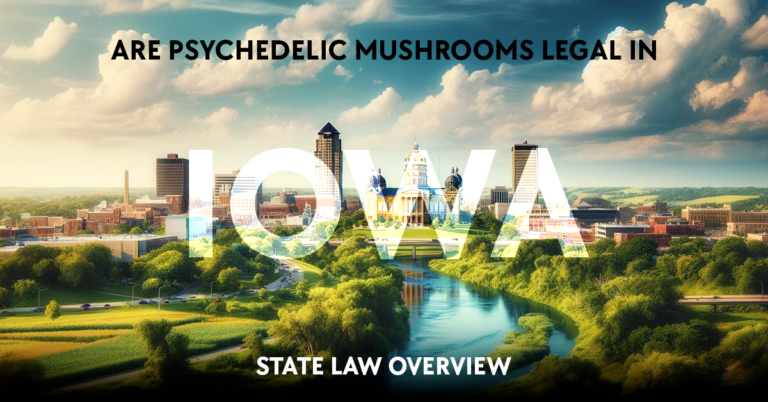Functional mushrooms and psychedelic mushrooms are two distinct categories of mushrooms with contrasting effects on the body and mind. Psychedelic mushrooms, also known as “magic mushrooms” or “shrooms,” contain psilocybin, a hallucinogenic compound that induces psychedelic effects and alters perception. They have a long history of use in spiritual practices, recreation, and increasingly, medicinal purposes. Recent research has shown their potential in treating mental illnesses such as depression, anxiety, and addiction. The legality of psychedelic mushrooms varies by country.
On the other hand, functional mushrooms, also called medicinal mushrooms or adaptogenic mushrooms, do not have psychedelic or hallucinogenic effects. Instead, they enhance the body’s overall functioning and provide various health benefits. Popular types of functional mushrooms include Reishi, Cordyceps, Chaga, and Lion’s Mane. These mushrooms have been used in traditional medicine to promote cardiovascular health, reduce inflammation, improve sleep, enhance cognitive function, support the immune system, and more. Functional mushrooms are legal worldwide and do not appear on the World Anti-Doping Agency’s list of banned substances.
Key Takeaways:
Table of Contents
- Functional mushrooms and psychedelic mushrooms have distinct effects on the body and mind.
- Psychedelic mushrooms contain psilocybin, a hallucinogenic compound, while functional mushrooms do not have psychedelic or hallucinogenic properties.
- Psychedelic mushrooms have a long history of spiritual, recreational, and medicinal use, while functional mushrooms are used primarily for their health benefits.
- Psychedelic mushrooms are being researched for their potential therapeutic uses in treating mental illnesses, while functional mushrooms are already used in medical contexts.
- It is important to consult with a doctor before starting any mushroom supplementation regimen and to follow recommended dosage instructions.
Psychedelic mushrooms, commonly referred to as “magic mushrooms” or “shrooms,” contain psilocybin, a hallucinogenic compound that induces psychedelic effects and alters perception. These mushrooms have a long history of use in spiritual practices, recreation, and increasingly, medicinal purposes. When consumed, psilocybin is converted into psilocin within the body, which interacts with serotonin receptors in the brain, resulting in profound changes in sensory perception, mood, thought patterns, and consciousness.
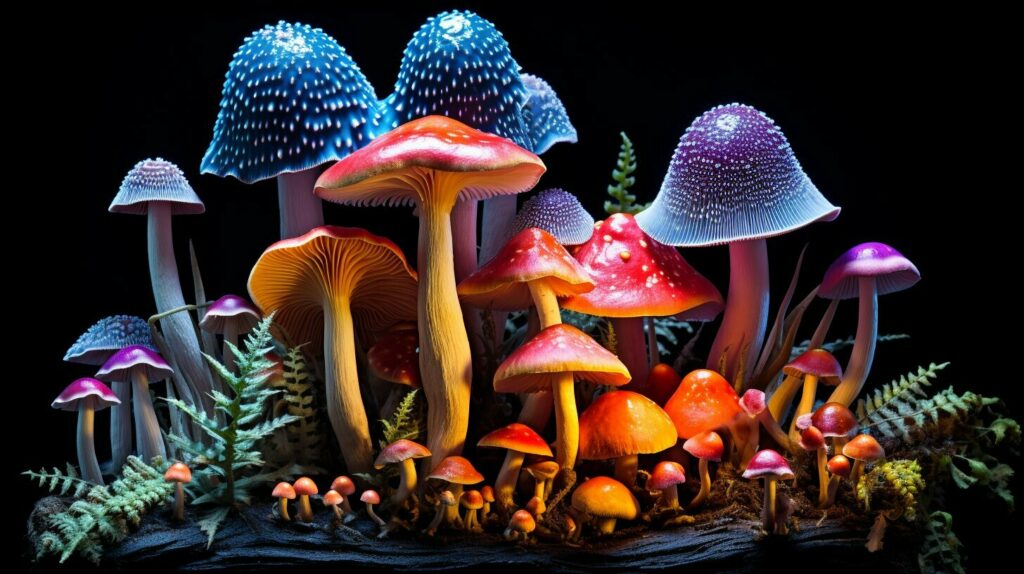
There are various types of psychedelic mushrooms, each with its own unique composition and potency. Some of the most common types include Psilocybe cubensis, Psilocybe semilanceata, and Psilocybe mexicana. These mushrooms can vary in appearance, ranging from small brown or tan caps to larger golden-colored or blue-stained mushrooms. They are often dried or consumed fresh, and in some cases, brewed into teas or incorporated into food.
In addition to their recreational use, psychedelic mushrooms are increasingly being studied for their potential therapeutic uses. Research suggests that psilocybin-assisted psychotherapy may be effective in treating mental illnesses such as depression, anxiety, and addiction. Studies have shown promising results in reducing symptoms, improving mood, and promoting long-term psychological well-being. However, it is important to note that the therapeutic use of psychedelic mushrooms should only be conducted under the guidance of trained professionals in safe, supervised settings.
| Type of Psychedelic Mushroom | Scientific Name | Common Name | Potency |
|---|---|---|---|
| Psilocybe cubensis | Psilocybe cubensis | Golden Teacher | Medium |
| Psilocybe semilanceata | Psilocybe semilanceata | Liberty Cap | High |
| Psilocybe mexicana | Psilocybe mexicana | Teonanácatl | Low |
While psychedelic mushrooms provide unique experiences and potential therapeutic benefits, it is essential to approach their usage with caution. The legality of psychedelic mushrooms varies by country, with some nations allowing their use in religious or cultural contexts, while others classify them as controlled substances. It is crucial to understand and abide by the laws and regulations in your specific location to avoid legal consequences.
The Legality of Psychedelic Mushrooms
The legality of psychedelic mushrooms differs from country to country, with some nations allowing their use for specific purposes while others prohibit them entirely. In many countries, the possession, cultivation, and sale of psychedelic mushrooms are strictly regulated or even illegal. For example, in the United States, psychedelic mushrooms are classified as Schedule I substances, which means they are considered to have a high potential for abuse and no accepted medical use.
However, there are exceptions to this general prohibition. In a few jurisdictions, such as the state of Oregon in the United States, the use of psychedelic mushrooms for therapeutic purposes is decriminalized or allowed under specific conditions. In other countries, such as Brazil and Jamaica, the religious or spiritual use of certain psychedelic mushrooms is protected by law.
It’s important to note that even in places where psychedelic mushrooms are illegal, there is growing interest in their potential therapeutic benefits. Research is ongoing to explore the use of psychedelic mushrooms in treating mental illnesses, addiction, and end-of-life anxiety. These studies may pave the way for changes in legislation and regulations surrounding psychedelic mushrooms in the future.
Table: Legal Status of Psychedelic Mushrooms by Country
| Country | Status |
|---|---|
| United States | Illegal at the federal level; some exceptions at the state and local levels |
| Canada | Illegal; exceptions for medical and research purposes in some provinces |
| Netherlands | Legal for personal use in small quantities |
| Brazil | Legal for religious and spiritual use |
| Jamaica | Legal for religious and spiritual use |
It is crucial to familiarize oneself with the specific laws and regulations regarding psychedelic mushrooms in the country or jurisdiction where one resides or plans to visit. Engaging in illegal activities can have serious legal consequences and should be avoided. Furthermore, it is always recommended to consult with a qualified healthcare professional before considering any type of psychedelic substance.
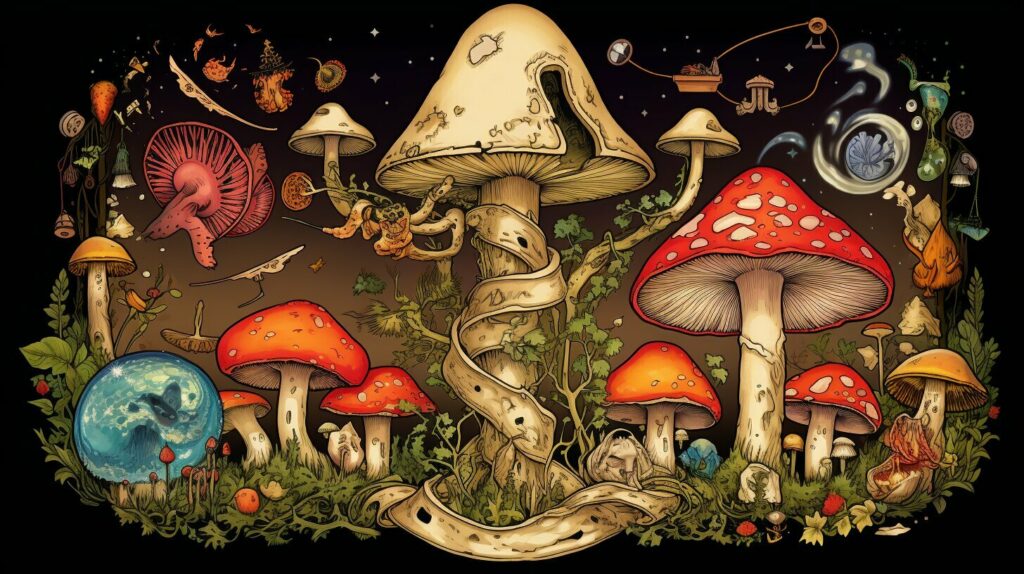
Functional mushrooms, often referred to as medicinal mushrooms or adaptogenic mushrooms, do not have psychedelic or hallucinogenic effects and instead enhance the body’s overall functioning while providing numerous health benefits. These mushrooms are known for their natural bioactive compounds, including polysaccharides, terpenoids, and phenols, which contribute to their therapeutic properties. Some of the most popular types of functional mushrooms include:
- Reishi: Also known as the “Mushroom of Immortality,” Reishi mushrooms have been used for centuries in traditional Chinese medicine to support the immune system, reduce inflammation, and promote relaxation and sleep.
- Cordyceps: Cordyceps mushrooms are recognized for their potential to enhance athletic performance, improve respiratory function, and increase energy levels. They have been traditionally used to increase stamina and endurance.
- Chaga: Chaga mushrooms are rich in antioxidants and have been studied for their potential anti-inflammatory and immune-modulating effects. They are commonly consumed as a tea or in supplement form.
- Lion’s Mane: Lion’s Mane mushrooms are known for their unique appearance and potential cognitive benefits. They may enhance brain function, memory, and focus, making them popular among students and professionals.
These functional mushrooms can be consumed in various forms, including powders, capsules, extracts, and teas. They are readily available in health food stores and online retailers.
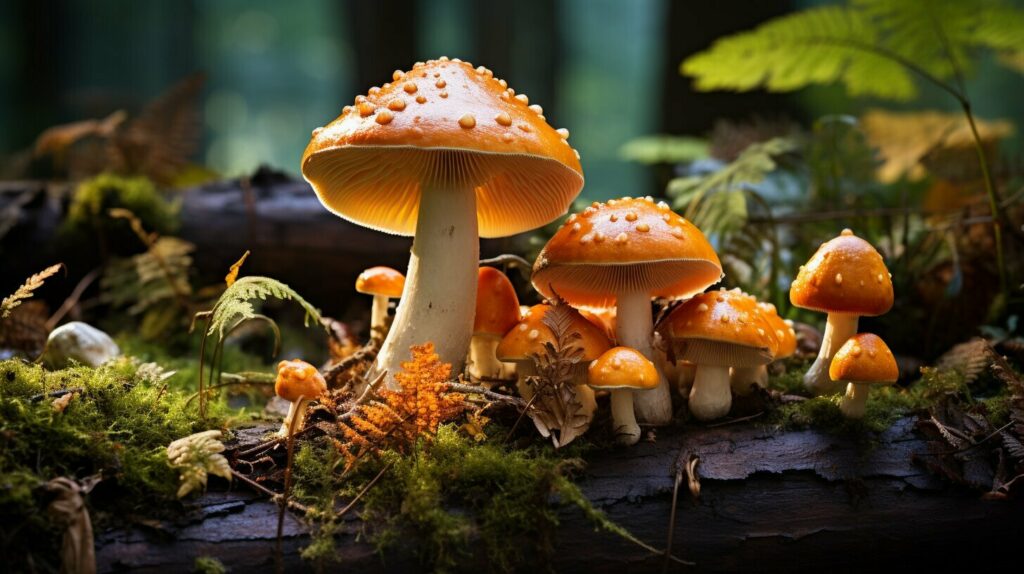
Benefits of Functional Mushrooms
The health benefits of functional mushrooms are vast and have been studied extensively. These mushrooms have been shown to:
- Support immune function and increase resistance to infections.
- Reduce inflammation and oxidative stress in the body.
- Promote cardiovascular health by improving blood circulation and reducing cholesterol levels.
- Enhance cognitive function, memory, and focus.
- Support liver health and aid in detoxification.
- Improve energy levels and reduce fatigue.
- Regulate blood sugar levels and support insulin sensitivity.
- Protect against the negative effects of stress and promote relaxation.
- Enhance the body’s natural defenses against cancer cells.
While more research is needed to fully understand the mechanisms behind these benefits, functional mushrooms have gained popularity as natural remedies for various health conditions. However, it is important to note that individual results may vary, and functional mushrooms should not replace any prescribed medications or treatments without consulting a healthcare professional.
Uses of Functional Mushrooms
Functional mushrooms have been utilized in traditional medicine for a variety of therapeutic purposes, including promoting cardiovascular health, reducing inflammation, improving sleep, enhancing cognitive function, and supporting the immune system. These mushrooms contain a wide range of bioactive compounds that contribute to their beneficial effects on the body and mind.
One popular functional mushroom is Reishi, which has been used for centuries in traditional Chinese medicine to promote overall well-being and longevity. It is known for its immune-boosting properties and its ability to reduce inflammation in the body. Reishi is often taken in the form of capsules, powders, or teas.
Another functional mushroom with numerous health benefits is Cordyceps. It is believed to enhance athletic performance, improve endurance, and increase energy levels. Cordyceps is often used by athletes and individuals looking to enhance their physical performance. It is available in various forms, including capsules, tinctures, and extracts.
Lion’s Mane is a functional mushroom that has gained popularity for its cognitive-enhancing effects. It is believed to support brain health, improve memory and focus, and promote nerve regeneration. Lion’s Mane is available in supplement form or can be consumed as a culinary mushroom.
Chaga is another functional mushroom known for its immune-boosting properties. It is rich in antioxidants and has been used to support the immune system, reduce inflammation, and fight oxidative stress. Chaga is typically consumed as a tea or in supplement form.
Functional mushrooms can be incorporated into one’s daily routine through supplementation or by including them in meals. However, it is important to note that while functional mushrooms have many potential health benefits, they should be used as a complement to, rather than a replacement for, traditional medical treatments. Consulting with a healthcare professional is recommended before starting any supplementation regimen to ensure safe and appropriate usage.
| Mushroom Type | Health Benefits |
|---|---|
| Reishi | Boosts immune system, reduces inflammation |
| Cordyceps | Enhances athletic performance, increases energy |
| Lion’s Mane | Improves cognitive function, supports brain health |
| Chaga | Strengthens immune system, fights oxidative stress |

Differences between Functional and Psychedelic Mushrooms
While functional mushrooms and psychedelic mushrooms both have potential medicinal benefits, they have distinct effects and purposes. Functional mushrooms, such as Reishi, Cordyceps, Chaga, and Lion’s Mane, do not have psychedelic or hallucinogenic effects. They work by enhancing the body’s natural functioning, improving overall health and well-being. On the other hand, psychedelic mushrooms, also known as “magic mushrooms” or “shrooms,” contain a compound called psilocybin, which induces hallucinogenic and psychedelic effects.
Psychedelic mushrooms have a long history of use in spiritual practices and recreation. Recently, there has been growing interest in their potential therapeutic uses, particularly in the treatment of mental illnesses such as depression, anxiety, and addiction. However, due to legal restrictions, research into their benefits is still in its early stages. The legality of psychedelic mushrooms varies by country, with some countries allowing their use for medical or religious purposes.
Functional mushrooms, on the other hand, are legal worldwide and are widely used in medical contexts. They have been used in traditional medicine for centuries and have established safety records. Functional mushrooms offer a range of health benefits, including promoting cardiovascular health, reducing inflammation, improving sleep, enhancing cognitive function, and supporting the immune system. They are often consumed in various forms, such as powders, capsules, or extracts, to harness their therapeutic properties.
| Functional Mushrooms | Psychedelic Mushrooms |
|---|---|
| Do not have psychedelic effects | Induce hallucinogenic and psychedelic effects |
| Enhance overall body functioning | Alter perception and consciousness |
| Used in traditional medicine for various health benefits | Historically used in spiritual practices and recreation |
| Legal worldwide | Legality varies by country |
While functional mushrooms are generally considered safe, it is important to consult with a healthcare professional before starting any supplementation regimen. They should not be used as a substitute for traditional medical treatment. On the other hand, psychedelic mushrooms should only be used under the guidance of trained professionals in safe, supervised settings. They may carry risks, especially for individuals with certain mental health conditions. It is crucial to prioritize safety and follow recommended dosage instructions.
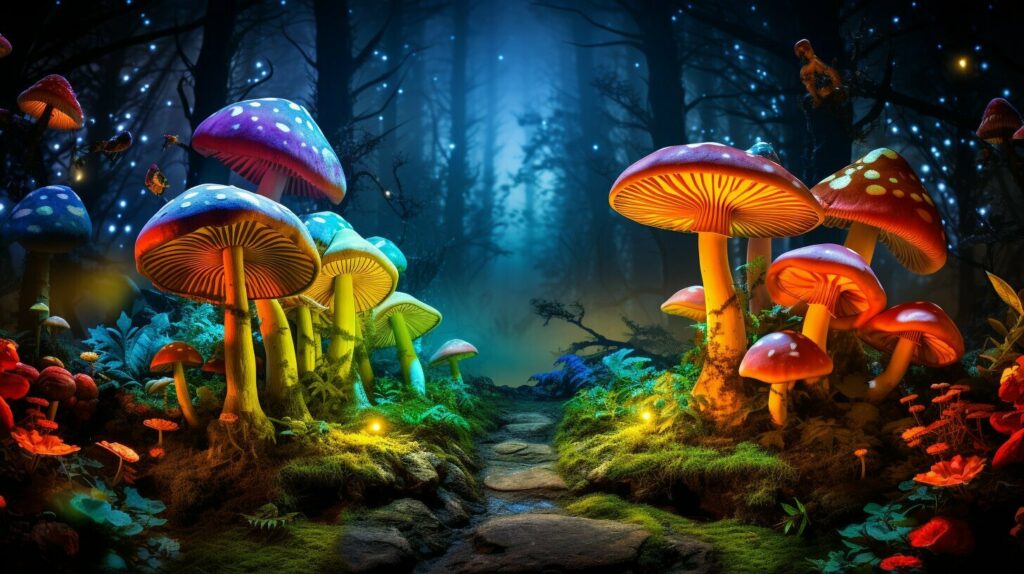
In conclusion, functional mushrooms and psychedelic mushrooms differ in terms of their effects, uses, and legal status. Functional mushrooms focus on enhancing overall body functioning and offer various health benefits, while psychedelic mushrooms induce hallucinogenic and psychedelic effects. Functional mushrooms are legal worldwide and widely used in medical contexts, while the legality of psychedelic mushrooms varies by country. It is important to consult with a healthcare professional before using any type of mushroom for medicinal purposes and to prioritize safety in their usage.
Safety and Legality of Functional Mushrooms
Functional mushrooms are legal worldwide and are considered safe for consumption, as they do not appear on the World Anti-Doping Agency’s list of banned substances. These mushrooms have been used for centuries in traditional medicine and have gained popularity in recent years for their numerous health benefits.
One of the reasons functional mushrooms are widely considered safe is because they do not have the psychedelic or hallucinogenic effects associated with psychedelic mushrooms. Unlike their psychedelic counterparts, functional mushrooms contain compounds that support the body’s overall well-being without inducing altered states of consciousness.
Research has shown that functional mushrooms have various health benefits. They are rich in bioactive compounds such as polysaccharides, triterpenes, and antioxidants, which contribute to their therapeutic effects. Different types of functional mushrooms have specific properties, making them suitable for addressing different health concerns. For example, Reishi mushrooms are known for their immune-boosting properties, while Lion’s Mane mushrooms are believed to enhance cognitive function.
Incorporating functional mushrooms into your diet can be done in various ways. They are available in different forms such as powders, extracts, capsules, and even coffee blends. It’s important to choose high-quality products from reputable sources to ensure you’re getting the full benefits of these mushrooms.
When considering mushroom supplementation, it’s always advisable to consult with a healthcare professional, especially if you have any underlying health conditions or are taking medications. They can provide personalized recommendations and help you determine the appropriate dosage for your specific needs.

| Functional Mushrooms | Health Benefits |
|---|---|
| Reishi | Boosts immune system, promotes relaxation, supports liver health |
| Cordyceps | Increases energy, improves athletic performance, enhances respiratory function |
| Chaga | Antioxidant, reduces inflammation, supports digestive health |
| Lion’s Mane | Enhances cognitive function, improves memory, promotes nerve regeneration |
Functional mushrooms offer a natural and holistic approach to supporting overall health and well-being. They can be a valuable addition to a balanced diet and healthy lifestyle, providing numerous benefits without the mind-altering effects of psychedelic mushrooms. With their worldwide legality and proven safety records, functional mushrooms are a promising avenue for those seeking to optimize their health naturally.
Considerations for Mushroom Supplementation
Before starting any mushroom supplementation regimen, it is important to consult with a doctor, follow recommended dosage instructions, and remember that functional mushrooms should not be used as a replacement for traditional medical treatment. Functional mushrooms, such as Reishi, Cordyceps, Chaga, and Lion’s Mane, have various health benefits and can enhance overall well-being. However, it is essential to approach mushroom supplementation with caution and be aware of potential interactions or side effects.
When consulting with a healthcare professional, they can assess your individual health needs and determine if mushroom supplementation is appropriate for you. They can also provide guidance on the dosage and frequency of use. While functional mushrooms are generally safe, it is always best to seek professional advice to ensure they align with your specific health conditions and medications.
In addition to consulting with a doctor, it is crucial to purchase high-quality mushroom products from reputable sources. Look for products that are tested for purity and contain the desired active compounds. The packaging should also provide clear instructions on dosage and storage.
Finally, it is important to recognize that functional mushrooms should complement, not replace, traditional medical treatment. While they offer potential health benefits, they should not be solely relied upon for addressing serious medical conditions. Always work with a healthcare professional to develop a comprehensive approach to your health and well-being.
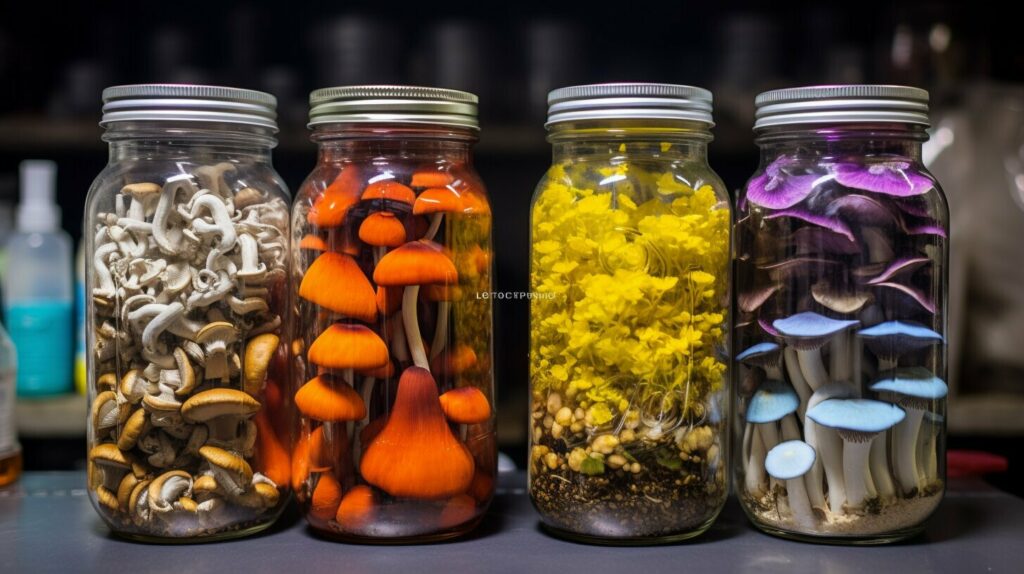
| Key Considerations for Mushroom Supplementation: | Importance |
|---|---|
| Consult with a healthcare professional | Ensure suitability and assess potential interactions |
| Purchase high-quality mushroom products | Ensure purity and efficacy |
| Follow recommended dosage instructions | Prevent potential adverse effects |
| Do not use as a replacement for traditional medical treatment | Complement existing healthcare approaches |
Psychedelic Mushrooms and Mental Health
Psychedelic mushrooms are being researched for their potential therapeutic uses in treating mental illnesses such as depression, anxiety, and addiction; however, it is crucial to use them under the guidance of trained professionals and be aware of potential risks, particularly for individuals with certain mental health conditions. The active compound in psychedelic mushrooms, psilocybin, interacts with serotonin receptors in the brain, resulting in profound alterations in perception, mood, and consciousness.
Recent studies have shown promising results in using psychedelic mushrooms as a treatment for various mental health disorders. Research conducted at reputable institutions, such as Johns Hopkins University and Imperial College London, suggests that psilocybin can facilitate breakthroughs in therapy by promoting emotional openness, enhancing introspection, and reducing symptoms of depression and anxiety.
One study published in JAMA Psychiatry found that a single psilocybin-assisted therapy session resulted in significant reductions in depression and anxiety symptoms in patients with treatment-resistant depression. Another study conducted at New York University showed that psilocybin-assisted therapy was effective in reducing distress and improving quality of life in patients with cancer-related anxiety and depression.
It’s important to note that psychedelic mushrooms should only be used in controlled settings with adequate supervision. The intensity of the experience and the potential for psychological and emotional upheaval necessitate a supportive environment and the guidance of experienced professionals. Individuals with a history of mental health conditions, such as psychosis or schizophrenia, should avoid using psychedelic mushrooms, as they may exacerbate symptoms and pose potential risks. It’s always recommended to consult with a healthcare professional before considering any alternative treatment options.
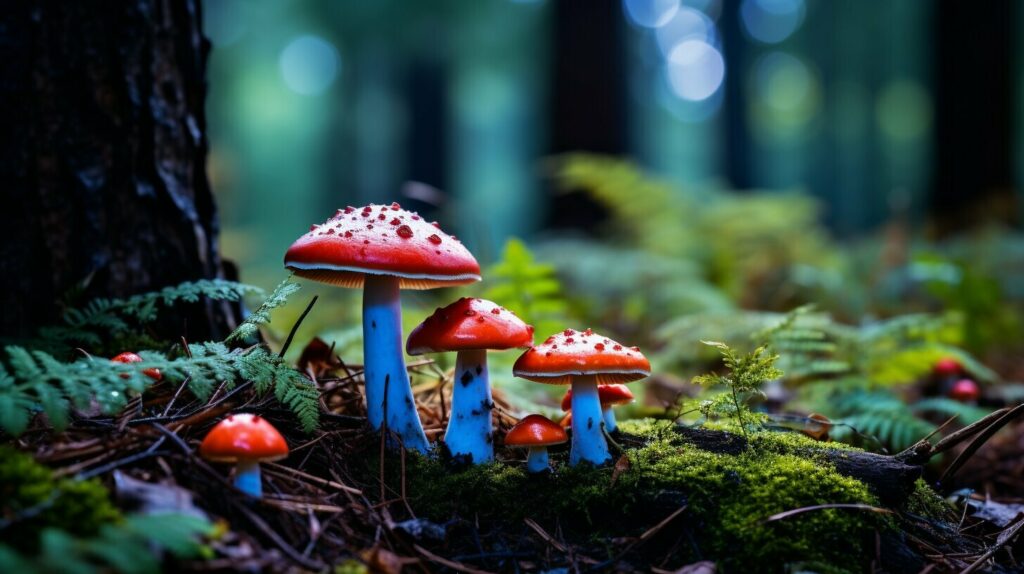
While psychedelic mushrooms hold promise as a therapeutic tool, it is crucial to acknowledge the potential risks associated with their use. These risks include:
- Bad trips: Psilocybin can induce intense experiences that may be overwhelming or distressing. It is essential to have a safe and supportive environment to help navigate through challenging trips.
- Pre-existing mental health conditions: Individuals with certain mental health conditions, such as bipolar disorder or schizophrenia, may be more susceptible to negative reactions when using psychedelic mushrooms.
- Flashbacks: Some users may experience flashbacks or recurring effects days, weeks, or even months after using psychedelic mushrooms. These flashbacks can be unexpected and may interfere with daily functioning.
- Unwanted effects: While the majority of psychedelic mushroom experiences are positive, there is a potential for unwanted physical and psychological effects, including nausea, anxiety, confusion, and agitation.
- Legal considerations: The legality of psychedelic mushrooms varies by country and jurisdiction. It is essential to be aware of the legal status and potential legal consequences before engaging in their use.
| Potential Benefits | Potential Risks |
|---|---|
| Reduction in depression and anxiety symptoms | Intense or distressing experiences |
| Enhanced emotional openness and introspection | Risks for individuals with pre-existing mental health conditions |
| Improved quality of life in patients with cancer-related anxiety and depression | Flashbacks and unwanted effects |
In conclusion, psychedelic mushrooms are a subject of increasing interest in the field of mental health. While research suggests their potential therapeutic uses, it is crucial to approach their use with caution. Only under the guidance of trained professionals in controlled settings can the benefits be maximized while minimizing potential risks.
Conclusion
In conclusion, functional mushrooms and psychedelic mushrooms are distinct categories with different effects and uses, and individuals should consult with a healthcare professional before incorporating any type of mushroom into their medicinal routine.
Factual data: Functional mushrooms and psychedelic mushrooms are two different categories of mushrooms with distinct effects on the body and mind. Psychedelic mushrooms, also known as “magic mushrooms” or “shrooms,” contain psilocybin, a hallucinogenic compound that induces psychedelic effects and alters perception. They have a long history of use in spiritual practices, recreation, and increasingly, medicinal purposes. Recent research has shown their potential in treating mental illnesses such as depression, anxiety, and addiction. The legality of psychedelic mushrooms varies by country.
On the other hand, functional mushrooms, also called medicinal mushrooms or adaptogenic mushrooms, do not have psychedelic or hallucinogenic effects. Instead, they enhance the body’s overall functioning and provide various health benefits. Popular types of functional mushrooms include Reishi, Cordyceps, Chaga, and Lion’s Mane. These mushrooms have been used in traditional medicine to promote cardiovascular health, reduce inflammation, improve sleep, enhance cognitive function, support the immune system, and more. Functional mushrooms are legal worldwide and do not appear on the World Anti-Doping Agency’s list of banned substances.
While both functional mushrooms and psychedelic mushrooms have potential medicinal benefits, they have different effects and uses. Psychedelic mushrooms can induce a “trip” or altered state of consciousness, while functional mushrooms do not. Psychedelic mushrooms are being explored for therapeutic purposes, but research into their benefits is still in its early stages due to legal restrictions. Functional mushrooms, on the other hand, are already used in medical contexts and have established safety records.
It is important to consult with a doctor before starting any mushroom supplementation regimen and to follow recommended dosage instructions. Functional mushrooms are generally considered safe, but they should not be used as a substitute for traditional medical treatment. Psychedelic mushrooms should only be used under the guidance of trained professionals in safe, supervised settings and may carry risks for individuals with certain mental health conditions.
FAQ
Q: What are functional mushrooms?
A: Functional mushrooms, also known as medicinal mushrooms or adaptogenic mushrooms, are a category of mushrooms that do not have psychedelic or hallucinogenic effects. Instead, they enhance the body’s overall functioning and provide various health benefits.
Q: What are psychedelic mushrooms?
A: Psychedelic mushrooms, also known as “magic mushrooms” or “shrooms,” contain psilocybin, a hallucinogenic compound that induces psychedelic effects and alters perception. They have a long history of use in spiritual practices, recreation, and increasingly, medicinal purposes.
Q: Are functional mushrooms legal?
A: Yes, functional mushrooms are legal worldwide and do not appear on the World Anti-Doping Agency’s list of banned substances.
Q: What types of health benefits do functional mushrooms provide?
A: Functional mushrooms have been used in traditional medicine to promote cardiovascular health, reduce inflammation, improve sleep, enhance cognitive function, support the immune system, and more.
Q: What are the therapeutic uses of psychedelic mushrooms?
A: Psychedelic mushrooms are being explored for their potential in treating mental illnesses such as depression, anxiety, and addiction. However, research into their benefits is still in its early stages due to legal restrictions.
Q: Are psychedelic mushrooms legal?
A: The legality of psychedelic mushrooms varies by country. It is important to research and understand the laws in your specific location before obtaining or using them.
Q: How should I approach mushroom supplementation?
A: It is important to consult with a doctor before starting any mushroom supplementation regimen. Follow recommended dosage instructions and do not use functional mushrooms as a substitute for traditional medical treatment.
Q: What are the risks associated with psychedelic mushrooms?
A: Psychedelic mushrooms should only be used under the guidance of trained professionals in safe, supervised settings. They may carry risks for individuals with certain mental health conditions, and it is important to proceed with caution.

